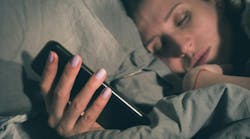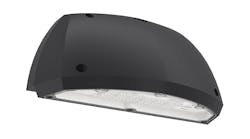Disclaimer: We have our tongue planted somewhat in our cheek as we write this story.
Still, LEDs Magazine thought it worth reporting that a team of Japanese researchers has identified yet another health implication linked to light sources. In this case, the type of lighting in your home could influence your body's ability to burn fat while you sleep. By implication, it can help you lose weight while you slumber.
Here's the skinny: if you use OLED lighting rather than LED lighting in the hours before you go to bed, your sleeping self will engage in a higher rate of lipolysis. That's a good thing for weight watchers, as lipolysis is the process of breaking down lipids such as fat.
“The inability to switch to fat oxidation during sleep is associated with an increased risk of obesity,” said the experts from the University of Tsukuba's International Institute for Integrative Sleep Medicine. “In the present study, evening exposure to LED light resulted in...a significant decrease in fat oxidation during sleep.”
The researchers published their findings in Nature.com's Scientific Reports, based on observations of only ten male participants exposed to either LED or OLED light for four hours before sleep, in a metabolic chamber.
They pointed out that OLED lighting has less short-wavelength blue light than does LED, and noted that the higher blue quotient in LEDs could possibly stymie lipolysis, although they were inconclusive on whether the blue quotient was indeed a culprit. (LEDs has written many health-related stories about the blue spectrum; reference the partial list below).
“Spectral composition alone seems to be insufficient to explicate these results,” the authors wrote.
Whether or not blue was the reason, the authors clearly observed more fat burning with OLED exposure than with LED exposure.
They observed other benefits as well.
“Following OLED exposure, energy expenditure and core body temperature during sleep were significantly decreased,” the team noted. Translation: OLED exposure brought on more restful sleep.
OLEDs — organic light-emitting diodes — are sheets of material that light up in response to an electric current. LEDs are diodes that output single points of light.
Both are used in television screens. LEDs are far more common in general illumination than are OLEDs, which are more expensive to manufacture, do not last as long, and which have a history of being less energy efficient although they are catching up.
OLEDs are working their way into the automotive sector. Vendors continue to also seek niche markets, such as recreational vehicles and refrigerators.
–
Getting the blues
A short list of some of the many stories we've written about the health implications of the blue spectrum:
Light therapy boosts bipolar patient wellbeing in Norway
New studies show cycles of blue and red light promote circadian entrainment
Human-centric lighting reduces drug reliance at Danish psychiatric hospital
Worry about the amount of light at night more than the blue wavelengths
Now the LRC calls blue a ‘significant’ melatonin suppressor
MARK HALPER is a contributing editor for LEDs Magazine, and an energy, technology, and business journalist ([email protected]).
For up-to-the-minute LED and SSL updates, why not follow us on Twitter? You’ll find curated content and commentary, as well as information on industry events, webcasts, and surveys on our LinkedIn Company Page and our Facebook page.






